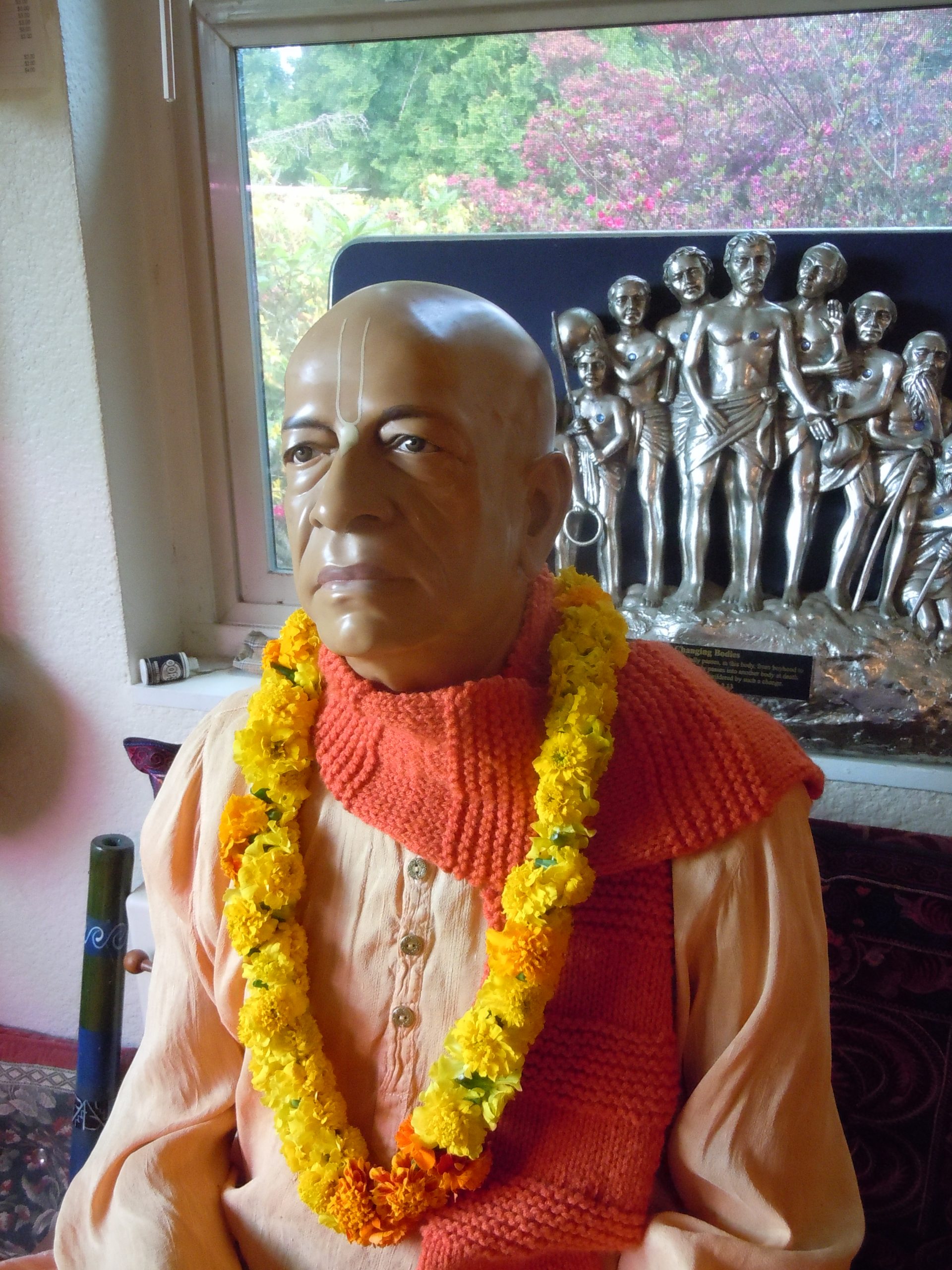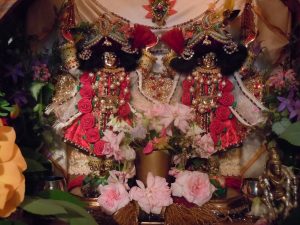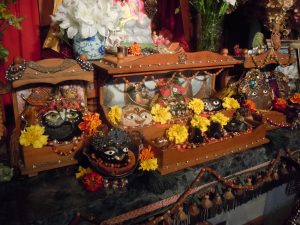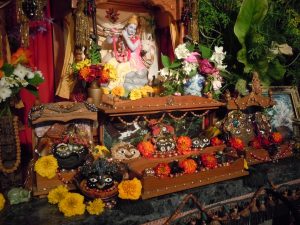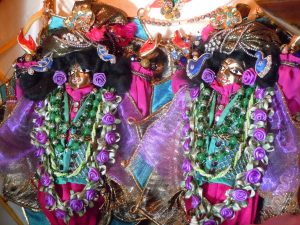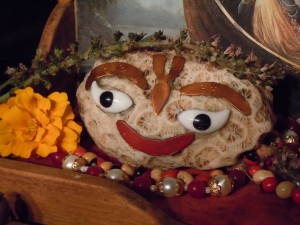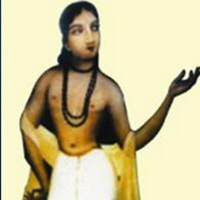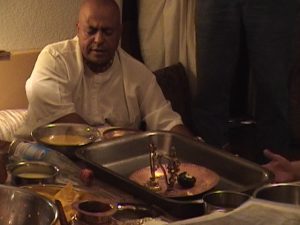Hare Krsna-Below are a few verses and purports from the famous CC Madhya chapter 24 which is an ocean of nectar and information concerning devotees, behavior, mantras, Deities and the spiritual master. I have not included everything contained in that chapter because it is just too voluminous. If one is a serious devotee they are well advised to consult this specific chapter themselves for the complete picture that Srila Prabhupada gives to us about poure devotional service and attaining love of Godhead-Krsna
Hare Krsna
damaghosa das
——————————–
Madhya 24.330 purport…
“One who engages in full devotional service, who does not fall down in any circumstances at once transcends the modes of material nature and thus comes to the level of Brahman.” When one engages in the Supreme Lord’s devotional service, he is in a transcendental position. Even though one may be situated in the mode of goodness in the material world, he is susceptible to pollution by the modes of passion and ignorance. When the mode of goodness is mixed with the mode of passion, one worships the sun-god, Vivasvān. When the mode of goodness is mixed with the mode of ignorance, he worships Gaṇapati, or Gaṇeśa. When the mode of passion is mixed with the mode of ignorance, one worships Durgā, or Kālī, the external potency. When one is simply in the mode of ignorance, he becomes a devotee of Lord Śiva because Lord Śiva is the predominating deity of the mode of ignorance within this material world. However, when one is completely free from the influence of all the modes of material nature, he becomes a pure Vaiṣṇava on the devotional platform. Śrīla Rūpa Gosvāmī states in the Bhakti-rasāmṛta-sindhu: anyābhilāṣitā-śūnyaṁ jñāna-karmādy-anāvṛtam ānukūlyena kṛṣṇānu-
śīlanaṁ bhaktir uttamā ..The position of viśuddha-sattva is the position of uncontaminated goodness. On that platform, one can then understand, ārādhyo bhagavān vrajeśa-tanayas tad-dhāma vṛndāvanam: “The Supreme Personality of Godhead, the son of Nanda Mahārāja, is to be worshiped along with His transcendental abode, Vṛndāvana.”
The word sarva-mantra-vicāraṇa means “considering all different types of mantras.” There are different kinds of mantras for different kinds of devotees. There are the mantras known as the dvādaśākṣara, and these are composed of twelve syllables. Similarly, there are mantras composed of eighteen syllables-the Nārasiṁha mantra, the Rāma mantra, Gopāla mantra and so on. Each and every mantra has its own spiritual significance. The spiritual master has to select a mantra for his disciple according to the disciple’s ability to chant different mantras.
Madhya 24.331—
purport…If one actually wants to serve Kṛṣṇa, it doesn’t matter whether one is a śūdra, vaiśya, or even a woman. If one is sincerely eager to chant the Hare Kṛṣṇa mantra or dīkṣā-mantra, he is qualified to be initiated according to the pāñcarātrika process. According to Vedic principles, only a brāhmaṇa who is fully engaged in his occupational duties can be initiated. Śūdras and women are not admitted to a vaidika initiation. Unless one is fit according to the estimation of the spiritual master, one cannot accept a mantra from the pāñcarātrika-vidhi or the vaidika-vidhi. When one is fit to accept the mantra, he is initiated by the pāñcarātrika-vidhi or the vaidika-vidhi. In any case, the result is the same.
Regarding mantra-siddhi-ādi-śodhana, the efficiency of the mantra, Śrīla Bhaktisiddhānta Sarasvatī Ṭhākura gives sixteen divisions, which are confirmed in the Hari-bhakti-vilāsa (beginning with 1.204): siddha-sādhya-susiddhāri- kramāj jñeyo vicakṣaṇaiḥ
…Those who are initiated with the eighteen-alphabet mantra do not need to consider the above-mentioned sixteen divisions. As enjoined in the Hari-bhakti-vilāsa (1.215, 219, 220):
There is śodhana, or purification of the mantra, but there is no such consideration for the Kṛṣṇa mantra. Balitvāt kṛṣṇa-mantrāṇāṁ saṁskārāpekṣaṇaṁ na hi. “The Kṛṣṇa mantra is so strong that there is no question of śodhana. (1.235)
As far as dīkṣā is concerned, one should consult Madhya-līlā, Chapter Fifteen (108). On the whole, when a person is initiated according to the pāñcarātrika-vidhi, he has already attained the position of a brāhmaṇa. This is enjoined in the Hari-bhakti-vilāsa (2.12):yathā kāñcanatāṁ yāti kāṁsyaṁ rasa-vidhānataḥ tathā dīkṣā-vidhānena dvijatvaṁ jāyate nṛṇām
“As bell metal can be turned into gold when treated with mercury, a disciple initiated by a bona fide guru immediately attains the position of a brāhmaṇa.”
As far as the time of dīkṣā (initiation) is concerned, everything depends on the position of the guru. As soon as a bona fide guru is received by chance or by a program, one should immediately take the opportunity to receive initiation. In the book called Tattva-sāgara, it is stated:
“If, by chance, one gets a sad-guru, it doesn’t matter whether one is in the temple or the forest. If the sad-guru, the bona fide spiritual master, agrees, one can be initiated immediately, without waiting for a suitable time or place.”
In the early morning hours (known as brāhma-muhūrta) one should get up and immediately chant the Hare Kṛṣṇa mantra, or, at least, “Kṛṣṇa, Kṛṣṇa, Kṛṣṇa.” In this way, one should remember Kṛṣṇa. Some ślokas or prayers should also be chanted. By chanting, one immediately becomes auspicious and transcendental to the infection of material qualities. Actually one has to chant and remember Lord Kṛṣṇa twenty-four hours daily, or as much as possible. smartavyaḥ satataṁ viṣṇur vismartavyo na jātucit sarve vidhi-niṣedhāḥ syur etayor eva kiṅkarāḥ
“Kṛṣṇa is the origin of Lord Viṣṇu. He should always be remembered and never forgotten at any time. All the rules and prohibitions mentioned in the śāstras should be the servants of these two principles.” This is a quotation from padma Purāṇa in the portion called Bṛhat-sahasra-nāma-stotra.
Madhya 24.334-“Also describe Deity worship, wherein one should offer food to Kṛṣṇa at least five times daily. One should in due time place Kṛṣṇa on a bed. You should also describe the process for offering ārati and the worship of the Lord according to the list of five, sixteen or fifty ingredients.
PURPORT….
In the Hari-bhakti-vilāsa (Eleventh Vilāsa, verses 127-140) there is a vivid description of what is required in Deity worship. There are sixty-four items mentioned. In the temple, worship should be so gorgeous that all sixty-four items should be available for the satisfaction of the Personality of Godhead. Sometimes it is impossible to get all sixty-four items; therefore we recommend that at least on the first day of installation all sixty-four items should be available. When the Lord is established, worship with all sixty-four items should continue as far as possible. The sixty-four items are as follows:
Madhya 24.336--“You should glorify the holy name and carefully give up offenses when chanting the holy name. One should know the symptoms of a Vaiṣṇava. One must give up or nullify all kinds of sevā-aparādha, offenses in Deity worship.
PURPORT-The devotee should always be very careful not to commit the ten offenses when chanting the Hare Kṛṣṇa mantra. If a devotee very strictly follows the methods of Deity worship, he will naturally and quickly become a pure Vaiṣṇava. A pure Vaiṣṇava has unflinching faith in the Lord, and he does not deviate at all. He is always engaged in perfect Deity worship.
One should also notice the specific offenses against Deity worship. These are mentioned in the Skanda Purāṇa (Avantī-khaṇḍa), spoken by Vyāsadeva himself. One should liquidate all kinds of offenses.
The śālagrāma-śilā should be worshiped with tulasī where a sufficient quantity of tulasī leaves are available. Worship of śālagrāma-śilā should be introduced in all ISKCON temples. Śālagrāma-śilā is the form of the Lord’s mercy. To worship the Deity with the sixty-four items mentioned may be a difficult job, but the Lord has become so small that anyone in any temple can carefully handle Deity worship simply by performing the same activities with śālagrāma-śilā.
Madhya 24.337-“The items of worship, such as water, conchshell, flowers, incense and lamp, should be described. You should also mention chanting softly, offering prayers, circumambulating, and offering obeisances. All these should be carefully studied.
PURPORT-All these are mentioned in the Hari-bhakti-vilāsa. The Aṣṭama Vilāsa of that book should be consulted as far as possible.
Madhya 24.345-“I have thus given a synopsis of the Vaiṣṇava regulative principles. I have given this in brief just to give you a little direction. When you write on this subject, Kṛṣṇa will help you by spiritually awakening you.”
Madhya 24.351-I have thus explained the mercy bestowed on Sanātana Gosvāmī by Śrī Caitanya Mahāprabhu. If one hears this, all moroseness in the heart will diminish.
Madhya 24.352–By reading these instructions to Sanātana Gosvāmī, one will become fully aware of Lord Kṛṣṇa’s various expansions and the process of devotional service according to the regulative principles and spontaneous love. Thus everything can be fully known.
Madhya 24.353–By reading this chapter, a pure devotee can understand love of Kṛṣṇa, the mellows of devotional service and the conclusion of devotional service. Everyone can understand all these things to their ultimate end by studying this chapter.
Madhya 24.354-The conclusion of this chapter can be known to one whose life and soul are the lotus feet of Śrī Caitanya Mahāprabhu, Nityānanda Prabhu and Advaita Prabhu.
Madhya 24 355--Praying at the lotus feet of Śrī Rūpa and Śrī Raghunātha, always desiring their mercy, I, Kṛṣṇadāsa, narrate Śrī Caitanya-caritāmṛta, following in their footsteps.
Thus end the Bhaktivedanta purports to Śrī Caitanya-caritāmṛta, Madhya-līlā, Twenty-fourth Chapter, describing the ātmārāma verse and the Lord’s mercy upon Sanātana Gosvāmī.
